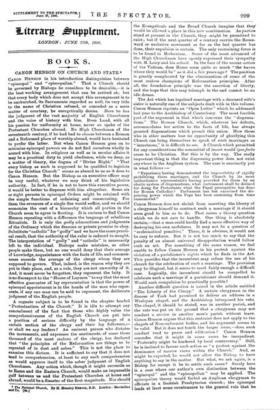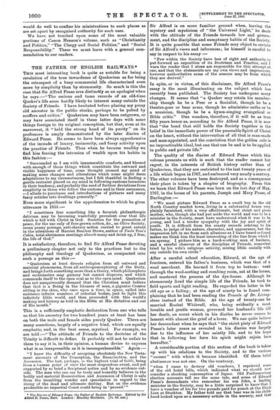BOOKS.
CANON HENSON ON CHURCH AND STATE.*
CANON HENSON in his introduction distinguishes between "episcopal' and " episcopalian." That a Church should be governed by Bishops he considers to be desirable,—it is the best working arrangement that can be arrived at; but that every body which does not accept this arrangement is to be unchurched, its Sacraments regarded as null, its very title to the name of Christian refused, or conceded as a mere matter of courtesy, he energetically denies. Here he has the judgment of the vast majority of English Churchmen and the voice of history with him. Even Laud, with all his passion for uniformity at home, never so spoke of the Protestant Churches abroad. No High Churchman of the seventeenth century, if he had had to choose between a Roman and a Reformed place of worship abroad, would have hesitated to prefer the latter. But when Canon Henson goes on to minimise episcopal powers we do not find ourselves wholly in aceord with him. In religious as well as in secular affairs it may be a practical duty to yield obedience, while we deny, as a matter of theory, the dogma of "Divine Right." "That every bishop as such is supposed to be qualified to legislate for the Christian Church" seems as absurd to us as it does to Canon Henson. But the Bishop as an executive officer may be very useful, whatever we may think of his legislative authority. In fact, if he is not to have this executive power, it would be better to dispense with him altogether. Some six or eight persons in episcopal Orders might be retained with the simple functions of ordaining and consecrating. For them the revenues of a single See would suffice, and we should economise the cost of a hierarchy which all parties in the Church seem to agree in flouting. It is curious to find Canon Henson repeating with a difference the language of rebellious Ritualists. It is only the godly admonitions and judgments of the Ordinary which the deacons or priests promise to obey. Substitute "catholic" for "godly" and we have the same practi- cal result, that the authority of the ruler is reduced to naught. The interpretation of "godly" and "catholic" is necessarily left to the individual. Bishops make mistakes, as other people make them, but no one would deny that their average of knowledge, acquaintance with the facts of life, and common- sense exceeds the average of the clergy whom they are supposed to govern. That, indeed, is the reason why they are put in their place, and, as a rule, they are not unworthy of it. And, it must never be forgotten, they represent the laity. It is no disrespect to the "House of Laymen "to say that the most effective guarantee of lay representation is that the power of episcopal appointment is in the hands of the man who repre- sents, if any one man can be said to represent, the deliberate judgment of the English people.
A cognate subject is to be found in the chapter headed "Protestantism of the Church." It is idle to attempt any concealment of the fact that those who highly value the comprehensiveness of the English Church are put into a position of serious difficulty by the language of a certain section of the clergy and their lay followers,— or shall we say leaders ? An eminent person who dictates the movements, and expresses the sentiments, of some three thousand of the most zealous of the clergy, has declared that "the principles of the Reformation are things to be repented of in dust and ashes." This is not the place to examine this dictum. It is sufficient to say that it does not tend to comprehension, at least to any such comprehension as would approve itself to the sober judgment of English Churchmen. Any action which, though it might reconcile us to Rome and the Eastern Church, would make an impassable gulf between us and the Protestant Churches at home and abroad, would be a disaster of the first magnitude. Nor should • Tits National Church, By H. Hensley Melon, B.Di London Macmillan • 114 Ccs• (614J
the Evangelicals and the Broad Church imagine that thej would be allowed a place in this new combination. As parties stand at present in the Church, they might be permitted to exist; but if the next quarter of a century carries the Rome- ward or exclusive movement as far as the last quarter has done, their expulsion is certain. The only restraining force is to be found in Modernism. Some of the most advanced of the High Churchmen have openly expressed their sympathy with M. Loisy and his school. In the face of the recent action of the Vatican, &es Rome seem quite as much "the haven
where they would be" as it did a few years ago ? The position is greatly complicated by the obscurantism of some of tbe
most zealous champions of Reformation principles. After all, the foundation principle was the assertion of liberty, and the hope that this may triumph in the end cannot be an idle dream.
The Act which has legalised marriage with a deceased wife's sister is naturally one of the subjects dealt with in this volume. Canon Henson reprints an "Open Letter" which he addressed last year to the Archbishop of Canterbury. The most forcible part of the argument is that which concerns the " dispensa- tions." The Roman Church, which, whatever her defects, accommodates her action to the facts of life, has always granted dispensations which permit this union. How those who in other matters lose no opportunity of glorifying this Church can bring themselves to speak of such marriages as
"incestuous," it is difficult to see. A Church which permitted for any considerations the committal of incest would ipso facto cease to be Christian. But this is by the way. The really important thing is that the dispensing power does not exist anywhere in the Anglican system. The case is succinctly put in what follows :—
"Experience having demonstrated prohibiting these marriages, and authoritative representative having elastic system of dispensations, what for doing for Protestants what the for Roman Catholics ? Parliament pausing power which the Pope has immemorial."
Canon Henson does not shrink from asserting the liberty of a clergyman himself to contract such a marriage if it should seem good to him so to do. That raises a thorny question which we do not care to handle. One thing is absolutely certain,—that a man could hardly find a more effeotivo way of destroying his own usefulness. It may not be a question of "ecclesiastical penalties." These, it is obvious, it would not be easy to enforce. But it is not too much to say that the penalty of an almost universal disapprobation would follow such an act. For something of the same reason, we feel unable to follow Canon Henson in his protest against the violation of a parishioner's rights which he finds in the Act. This provides that the incumbent may refuse the use of his church for the celebration of such a marriage. The provision may be illogical, but it seems to meet fairly enough a difficult case. Logically, the incumbent should be compelled to celebrate such a marriage if a parishioner should demand it. Would such compulsion be practically possible ?
Another difficult question is raised in the article entitled "The Liberty of the Clergy." A certain clergyman in the diocese of York had promised to deliver an address in a Wesleyan chapel, and the Archbishop interposed his veto. The chapel, it should be stated, was in another parish, and the veto was put on the ground that a clergyman may not conduct a service in another man's parish without leave. Canon Henson argues that this restraint does not apply to the
chapels of Nonconformist bodies, and his argument seems to be valid. But it does not touch the larger issue,—does such
conduct tend to peace and edification ? Canon Henson concedes that it might in some cases be inexpedient. "Fraternity might be hindered by local controversy." Still,
he is inclined to favour such action as "a protest against the dominance of narrow views within the Church." And, as might be expected, be would not allow the Bishop to have anything to say in the matter. But what, we ask again, is a Bishop for ex,cept it be to settle such cases ? Surely here is a case where our author's own distinction between the "episcopal" and the " episcopalian " may be applied. The episcopalian theory would forbid an Anglican clergyman to officiate in a Scottish Presbyterian church; the episcopal lends at least some countenance to the general rule that he
the impossibility of rigidly the Church by its most provided for them by an instrument shall be devised Papal prerogative has done has but exercised the dis- been exercising from time
would do well to confine his ministrations to such places as are set apart by recognised authority for such uses.
We have not touched upon some of the most valuable portions of Canon Henson's volume, such as "Christianity and Politics," "The Clergy and Social Politics," and "Social Responsibility." These we must leave with a general com- mendation to our readers.























































 Previous page
Previous page